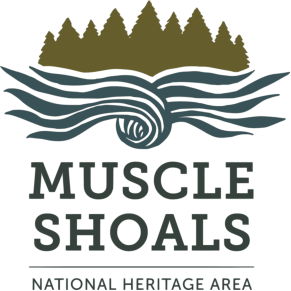History & Background
The Muscle Shoals National Heritage Area (MSNHA) was officially designated by Congress in 2009. The MSNHA spans the six counties of northwest Alabama’s Tennessee River water basin and was developed to help preserve the history of this region by focusing on three main themes: music, Native American heritage, and the Tennessee River. The University of North Alabama is MSNHA’s fiduciary & provides office space & administrative support. MSNHA is part of UNA’s Sanders College of Business and Technology.
MSNHA began in 1999 following a grassroots-led community session, “Muscle Shoals Reconsidered.” During this conference, local leaders discussed creating a relationship between the region’s cultural aspects and its quality of life. Following a second conference, “Muscle Shoals Reconsidered II,” two committees were developed to explore the issue. In 2000 a study of the cultural heritage of the Muscle Shoals Region identified opportunities for coalition building, established an inventory of assets, weighed the liabilities and validated earlier assumptions. The study also helped define the themes, boundaries and stories of the Muscle Shoals region. In 2001 Alabama Rep. Robert “Bud” Cramer introduced legislation into the House of Representatives directing the Secretary of the Interior to study the suitability and feasibility of establishing the MSNHA. The legislation was signed into law in 2002, and the designation was approved in 2009. Congress approved the final draft of MSNHA’s management plan in 2014.
About National Heritage Areas
The National Heritage Area (NHA) program, established by the Department of Interior and the National Park Service, recognizes regions throughout the U.S. with significant historical, cultural or natural features that help tell a national story of the country’s evolution. Congress designates National Heritage Areas, which must meet strict requirements. The MSNHA is one of 62 NHAs currently designated. For more information, visit the National Heritage Areas website. Since each NHA has its own Congressional authorization, management plans are unique to each heritage area. This flexibility allows NHAs to structure themselves efficiently & successfully maximize their effectiveness their communities.
Management Plan Documents
Please note that although these are labeled “draft,” they are the final and federally approved versions:
Appalachian Gateway Initiative Report
Designation Legislation
HR 1483 EH, Subtitle C — Muscle Shoals National Heritage Area
